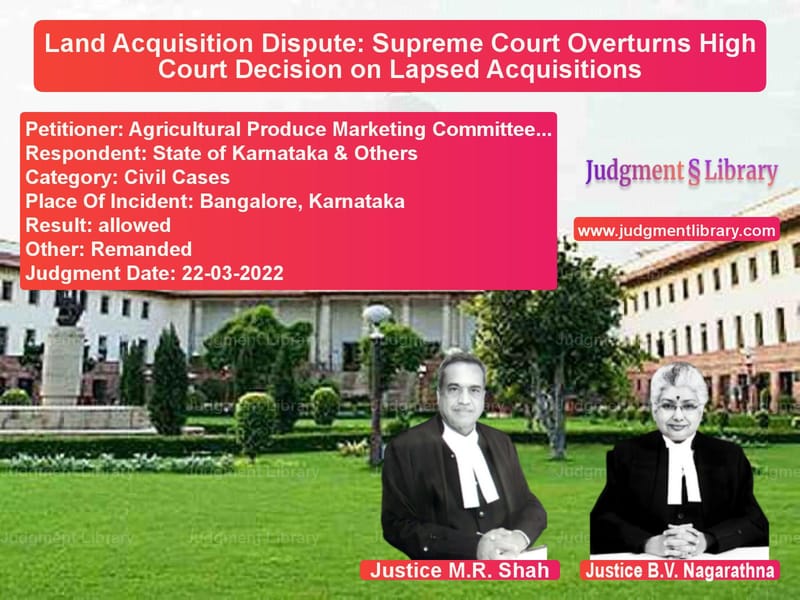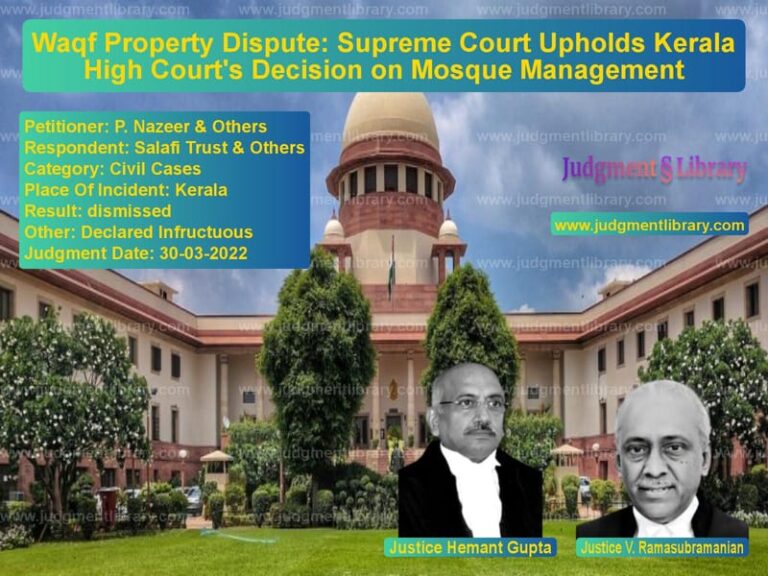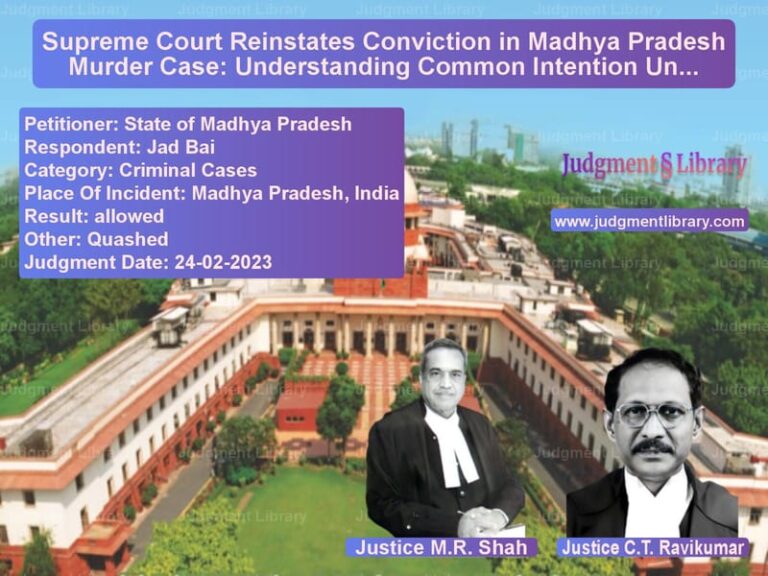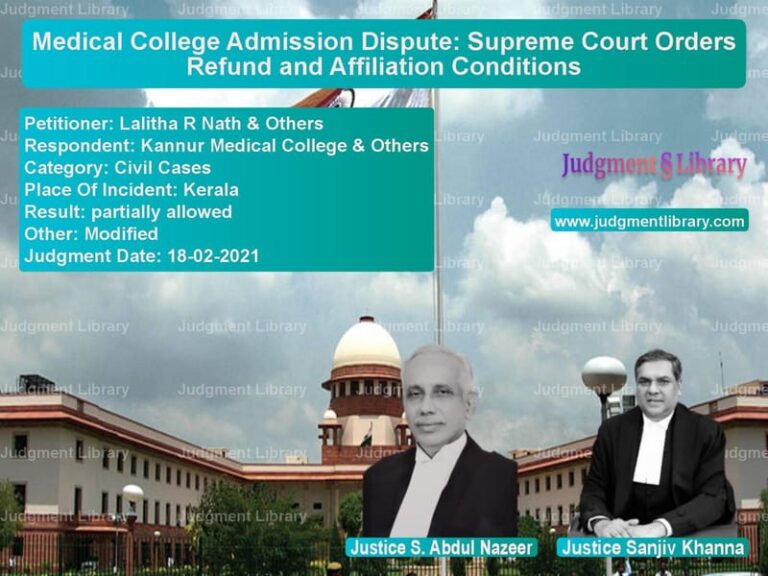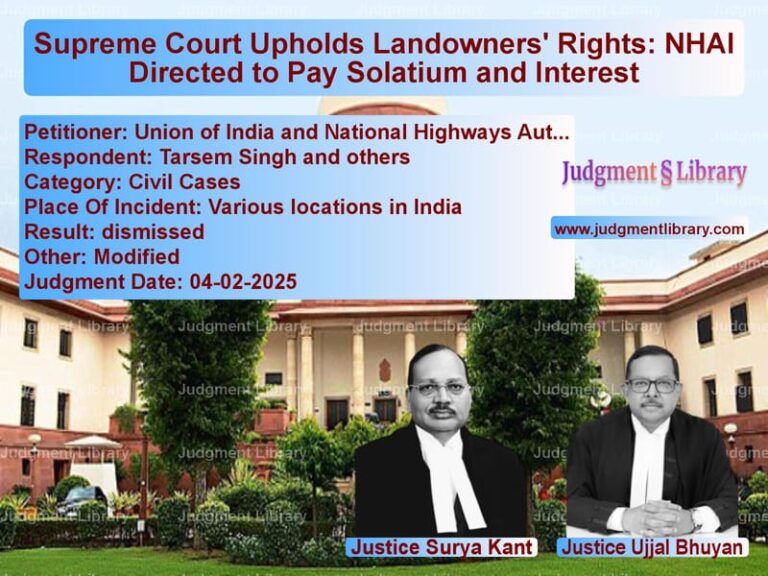Land Acquisition Dispute: Supreme Court Overturns High Court Decision on Lapsed Acquisitions
The case of Agricultural Produce Marketing Committee (APMC) vs. State of Karnataka & Others revolves around the controversial land acquisition process and whether the acquisition had lapsed under the Right to Fair Compensation and Transparency in Land Acquisition, Rehabilitation and Resettlement Act, 2013. The Supreme Court ruled on the legality of the acquisition and addressed the interpretation of Section 24(2) of the 2013 Act.
This judgment is significant as it clarifies how courts should assess lapses in land acquisitions and ensures that procedural delays, often caused by judicial interventions, do not unfairly benefit landowners while disregarding the interests of acquiring authorities.
Background of the Case
The dispute concerns the acquisition of large tracts of land in Karnataka by the Agricultural Produce Marketing Committee (APMC), Bangalore. The land was acquired in three parts:
- 172 acres 22 guntas of land owned by Jamanlal Bajaj Seva Trust (First Acquisition).
- 104 acres 5 guntas of land owned by the same Trust (Second Acquisition).
- 3 acres 34 guntas of land (not the subject matter of appeal).
The acquisitions were challenged in multiple writ petitions by landowners and other interested parties. The Karnataka High Court ruled that the acquisition had lapsed under Section 24(2) of the 2013 Act, leading APMC to appeal before the Supreme Court.
Read also: https://judgmentlibrary.com/supreme-court-upholds-specific-performance-in-land-sale-dispute/
Legal Issues Considered
- Whether the acquisition had lapsed under Section 24(2) of the 2013 Act.
- The impact of judicial stays on the land acquisition process.
- The applicability of the Supreme Court’s ruling in Indore Development Authority vs. Manoharlal (2020).
- Whether possession and compensation requirements were met under the Land Acquisition Act, 1894.
Petitioner’s Arguments (APMC)
- The acquisitions were delayed due to judicial interventions and were not abandoned by the State.
- The High Court failed to exclude the period of judicial stays when calculating the five-year limit under Section 24(2) of the 2013 Act.
- In respect of 100 acres of land, possession was taken, and compensation was deposited. Thus, the acquisition did not lapse.
- The 2013 Act does not revive old cases where judicial orders prevented possession or payment of compensation.
Respondent’s Arguments (Landowners)
- The State had no intent to complete the acquisition process, leading to an automatic lapse under Section 24(2) of the 2013 Act.
- The land was being used for public welfare and Gandhian activities, which should exempt it from acquisition.
- Despite the 2013 Act, no proper compensation was paid, and possession was not legally taken.
Supreme Court’s Judgment
The Supreme Court bench, comprising Justices M.R. Shah and B.V. Nagarathna, ruled in favor of APMC and overturned the High Court’s decision. The key observations were:
1. High Court Misinterpreted Section 24(2) of the 2013 Act
“The view taken by the High Court while declaring the acquisition proceedings have lapsed under Section 24(2) of the Act, 2013, is unsustainable and is just contrary to the law laid down by this Court in Indore Development Authority.”
The Court emphasized that acquisitions do not lapse simply because compensation was not paid or possession was delayed due to judicial orders.
2. Judicial Stays Must Be Excluded
“The period of subsistence of interim orders passed by court has to be excluded in the computation of five years.”
The Supreme Court ruled that judicial delays cannot be used to claim lapse of land acquisitions.
3. Compensation Payment and Possession
“In case possession has been taken, compensation has not been paid then there is no lapse. Similarly, if compensation has been paid, possession has not been taken then there is no lapse.”
Since APMC had taken possession of portions of the land and deposited compensation, the acquisitions were deemed valid.
Key Takeaways from the Judgment
- The Supreme Court reaffirmed that land acquisition does not lapse due to judicial delays.
- Authorities must prove they took reasonable steps to complete the acquisition.
- The ruling clarifies that Section 24(2) of the 2013 Act must be read in line with Indore Development Authority (2020).
- Judicial orders that delay possession or compensation must be excluded when calculating lapses.
Implications of the Verdict
This ruling is a crucial precedent for land acquisition disputes in India. It ensures that:
- Government acquisitions cannot be manipulated by landowners through prolonged litigation.
- Authorities can continue acquisition processes despite judicial delays.
- The 2013 Act cannot be used to revive time-barred cases where courts had stayed the acquisition.
Overall, this judgment strengthens the legal framework for land acquisitions and prevents misuse of procedural loopholes to delay or nullify government acquisitions.
Petitioner Name: Agricultural Produce Marketing Committee, Bangalore.Respondent Name: State of Karnataka & Others.Judgment By: Justice M.R. Shah, Justice B.V. Nagarathna.Place Of Incident: Bangalore, Karnataka.Judgment Date: 22-03-2022.
Don’t miss out on the full details! Download the complete judgment in PDF format below and gain valuable insights instantly!
Download Judgment: agricultural-produce-vs-state-of-karnataka-&-supreme-court-of-india-judgment-dated-22-03-2022.pdf
Directly Download Judgment: Directly download this Judgment
See all petitions in Property Disputes
See all petitions in Landlord-Tenant Disputes
See all petitions in Specific Performance
See all petitions in Judgment by Mukeshkumar Rasikbhai Shah
See all petitions in Judgment by B.V. Nagarathna
See all petitions in allowed
See all petitions in Remanded
See all petitions in supreme court of India judgments March 2022
See all petitions in 2022 judgments
See all posts in Civil Cases Category
See all allowed petitions in Civil Cases Category
See all Dismissed petitions in Civil Cases Category
See all partially allowed petitions in Civil Cases Category

